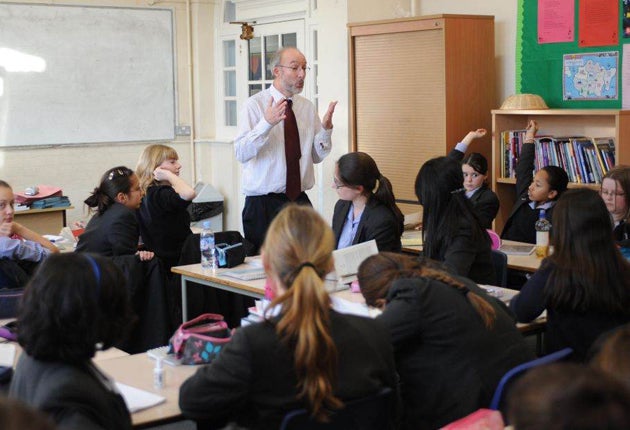No language GCSE means no sixth-form place, say top schools

Two of the top-performing state schools in the country have declared their sixth-forms a "no go" area for pupils without a top grade GCSE pass in a modern foreign language.
Chelmsford County High School for Girls and neighbouring King Edward Grammar School in Essex have said that, from September 2013, they will not accept pupils into their sixth forms unless they have at least one C grade GCSE in a modern foreign language.
Both specialist language schools, which have regularly topped exam performance league tables for state schools, say they have taken the unprecedented decision in an effort to halt the "deepening crisis" in language teaching in the UK.
This year, for the first time, French slipped out of the top 10 most popular GCSE subjects. Fewer than one in four pupils (22.7 per cent) now sit the exam.
Nicole Chapman, head of the girls' school, and Tom Sherrington, head of King Edward, said in a joint statement: "We are hugely concerned by the deepening crisis in language learning in the UK and feel compelled to play a part in supporting moves to break the cycle of decline which has been apparent in recent years."
Mrs Chapman said her school regularly attracts about 150 outside applications for up to 40 sixth-form places. Almost every girl already at the school gets a top grade GCSE pass in a modern language.
In their joint statement, she and Mr Sherrington added: "Almost all secondary schools offer language GCSEs and we want to encourage prospective students to take this opportunity wherever they can. Without a C grade GCSE, they will not be able to apply to our sixth forms.
"We believe language learning should be an entitlement for all and it concerns us that the lack of language provision in some areas is denying equal opportunities to some young people."
They concluded: "Above all, we want to celebrate the sheer joy of language learning... Our message to young people in Essex is to join us in catching the languages bug and to recognise that an investment in languages is an investment in their future."
This year's GCSE take-up showed the numbers taking French had declined from 341,604 in 2002 to 177,618. For German, the figures had slumped from 130,976 to 70,619.
Andrew Hall, chief executive of the Assessment and Qualifications Alliance, Britain's biggest exam board, described GCSE results day as "a rather sad day for languages".
The Education Secretary, Michael Gove, announced that ministers were considering a new English baccalaureate which would only be awarded to pupils who gained five A* to C grade passes in English, maths, science, modern foreign languages and a humanities subject.
The drop in languages take-up was exacerbated by the previous Labour government's decision six years ago to make the subject voluntary for 14- to 16-year-olds.
At a conference in London yesterday organised by the NASUWT teachers' union, teachers voted by 73 per cent to 21.6 per cent (with 5 per cent undecided) to make languages compulsory again at GCSE level to help promote global understanding.
Join our commenting forum
Join thought-provoking conversations, follow other Independent readers and see their replies
Comments